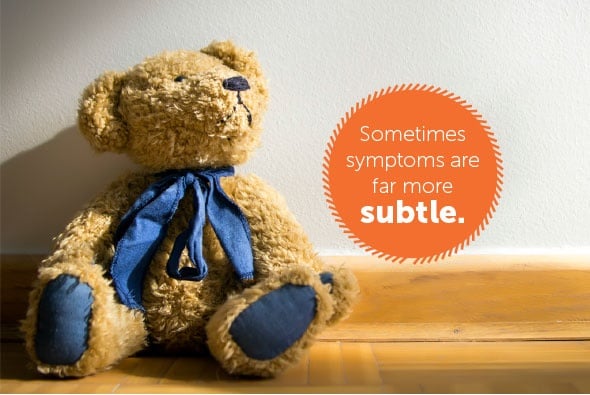
Epilepsy should be diagnosed early on to give a child the best chance for treatment success.
Symptoms of epilepsy can be difficult to recognise in children, however not all seizures involve obvious convulsions.
Sometimes symptoms are far more subtle, and these "hidden signs" often appear to fall within the range of normal
childhood behaviour. For example, some seizures resemble daydreaming; or a seizure that causes a toddler to stumble
and fall. When these seemingly common behaviours occur unusually often or in patterns, they may mean that your child
has epilepsy.
Epilepsy can also be difficult to diagnose in young children because they cannot clearly communicate their
subjective experience.
Recognise the "hidden signs" in children:
- Short spells of blank staring that look like daydreaming.
- Sudden falls for no apparent reason.
- Lack of response for brief periods.
- Dazed behaviour.
- Unusual sleepiness and irritability when wakened.
- Repetitive nodding.
- Rapid blinking.
- Frequent complaints from the child about things looking, sounding, tasting, smelling or feeling "funny".
- Clusters of "jackknife" movements in babies sitting down.
- Clusters of grabbing movements with both arms in babies lying on their backs.
- Sudden stomach pain followed by confusion and sleepiness.
- Repeated movements that look out of place or unnatural.
- Frequent stumbling or unusual clumsiness.
- Sudden episodes of fear for no apparent reason.

Recognise the "hidden signs" in adolescents:
Sometimes seizures start in adolescence. These seizures may be difficult to recognise, and are often misinterpreted as
"going through a phase", psychological problems or being under the influence of drugs or alcohol.
The following may be signs of a seizure:
- Blank staring, followed by chewing, picking at clothes, mumbling or random movements.
- Sudden fear, anger or anxiety for no apparent reason.
- Muscle jerks of the limbs or body, especially in the early morning.
- Reporting sensory changes: things look, sound, smell or feel strange or different.
- Memory gaps.
- Dazed behaviour.
- Being unable to talk or communicate normally for a short time.
These signs do not necessarily mean your child has epilepsy, but you should definitely speak to your doctor.
The importance of early diagnosis
Children whose seizures go unnoticed may face problems such as:
- Brief blackouts (loss of consciousness) make it hard to follow the teacher's instructions and keep up with
lessons in the classroom. - Sudden loss of awareness in certain situations, like swimming, climbing or riding a bicycle.
- The child may experience feelings that he or she cannot communicate, and becomes frustrated and "acts out".
- The child may withdraw socially or be excluded by other children.





 Publications
Publications
 Partners
Partners














